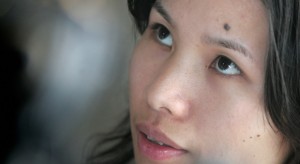ZENG JINYAN 09.19.14

Frederic J. Brown/AFP/Getty Images
Zeng Jinyan, the wife of Chinese activist Hu Jia, in March 2006, Beijing.
The essay that follows was written by Zeng Jinyan, whose husband, Hu Jia, has been prominently involved in activism around environmental issues, AIDS, and human rights in China over the past decade and a half and is a winner of the European Parliament’s Andrei Sakharov Prize for Freedom of Thought. From 2008 to 2011, he served a three and a half year prison sentence for inciting state subversion. Since his release, he has lived under varying degrees of surveillance and house arrest in his apartment in Beijing. He continues to write and is an active presence on Twitter. Zeng and Hu separated in 2012, and Zeng now lives in Hong Kong with their six-year-old daughter.
* * *
Baobao: “Fuck!”
Me: “Where’d you learn that word?”
Baobao: “Daddy’s good friends said it!”
Me: “Which good friends?”
Baobao: “Two of Daddy’s friends who stay in the same hotel with us, the ones who sleep in the rooms on either side of ours.”
I was silent for a moment. Okay, I said finally: “Next time Daddy’s friends say that, tell them they shouldn’t say such vulgar things when kids are around.”
My daughter, who’s almost seven years old, went back to her play.
I didn’t tell her that Daddy’s “friends” are actually plainclothes cops from state security—guobao—sent to keep watch over her father, preventing him from taking her out to see friends. Neither did I tell her that these “friends” had been part of our lives ever since she was in the womb. It was impossible to explain to her why her mommy and daddy, who loved each other very much, are now separated. In the two years since she and I moved to Hong Kong, spending holidays with her father in various hotels in cities across mainland China has become a routine for her. Daddy’s “friends” come and go, sometimes dropping in and out, sometimes completely dominating the schedules of these holidays. Her father has no choice; if he didn’t accept their presence, he’d have no way to watch his daughter grow. He couldn’t give her rides on his shoulders, couldn’t keep pace with her as she learns rudimentary English, couldn’t laugh at the funny stories she tells in Cantonese, and couldn’t answer her when she asks: “Why can’t Daddy get the papers he needs to come to Hong Kong?” At the end of almost every holiday, Daddy’s “friends” usually disregard the injunction not to get too familiar with her, and hug her, take her picture, give her presents. Some of these she cherishes, like the little stuffed bear she won’t let go of; others her mom has to confiscate: a pair of pink child-sized high-heeled shoes, big bowls of ice cream, huge piles of chocolates.
